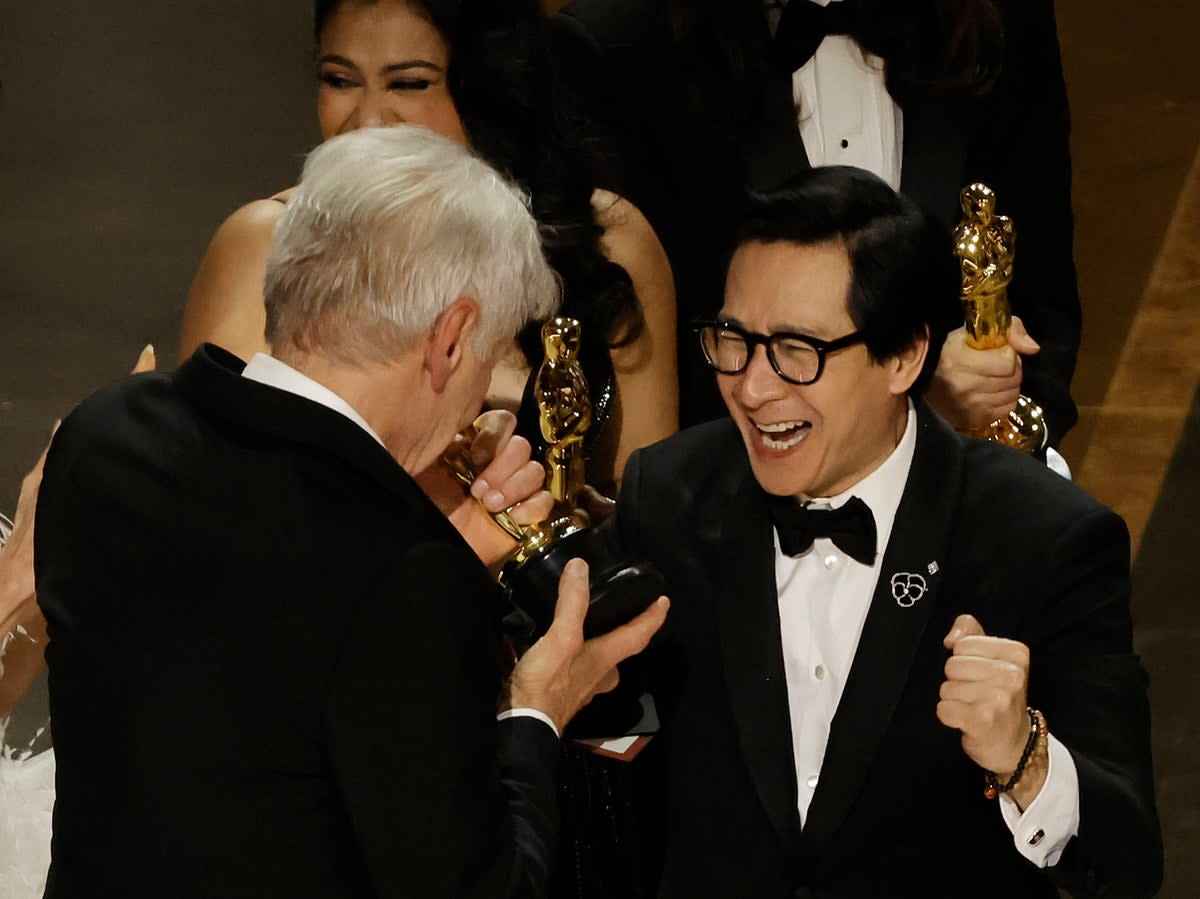From Michelle Yeoh to Brendan Fraser, this year’s Oscars gave the forgotten a second chance

When Harrison Ford announced Everything Everywhere All At Onceas this year’s Oscars Best Picture winner, its star Ke Huy Quan rushed to the stage and immediately leapt into the actor’s arms. Almost four decades ago, the pair had starred together in Indiana Jones and The Temple of Doom, when Quan was just a child. Ford’s career went from strength to strength. But the roles for Quan soon began to dry up, and he was forced to settle into a career of stunt coordination and assistant directing. Everything Everywhere All At Once wasn’t merely a comeback. It was a second chance at a dream.
So to see Quan, a newly crowned Oscar winner for Best Supporting Actor, offered the chance to celebrate with the same man who helped guide him through his very first steps into the industry – well, to quote the actor himself, “they say stories like this only happen in the movies”. The Oscars always like to talk the talk. Every year, we get the same twinkly-eyed speeches about how Hollywood is really a dream factory where we’re limited only by our own imaginations. Rarely does it ever feel like those words have any meaning. This year might be the rare exception.
Time and time again, in so many of the ceremony’s speeches, we saw reflected the same feeling of relief: that here, finally, the forgotten had been given a second chance. The unseen were finally being seen. Brendan Fraser, winning Best Actor for The Whale, spoke with gratitude – his performance was a major return to the industry, having experienced and survived some of its darkest aspects. Michelle Yeoh, who won Best Actress after a close race with Tar star Cate Blanchett, has spoken often about how she’s spent much of her illustrious career dreaming of a role like the one she was offered in Everything Everywhere All At Once. She was handed the statuette by Halle Berry, the only other woman of colour to win the award in 95 years.
Costume designer Ruth Carter made history by becoming the only Black woman to win two Oscars, both for her formidable work on the Black Panther films. Sarah Polley jokingly celebrated her Best Original Screenplay award for Women Talking by thanking “the Academy for not being so morally offended by the words ‘women’ and ‘talking’ so close together like that”. Even Best Animated Feature winner Guillermo del Toro spoke, with sincerity, about the importance of recognising “animation is cinema”.
The night wasn’t so gracious to all. Everything Everywhere All At Once’s sweep – the highest number of wins since 2008’s Slumdog Millionaire – came at the cost of Angela Bassett remaining unrecognised by the Academy. A frontrunner for Best Supporting Actress, she lost to Jamie Lee Curtis, a wonderful actor who had perhaps the weakest role in this year’s Best Picture winner. I’d argue the snub here has less to do with the particulars of Bassett’s performance in Black Panther: Wakanda Forever (beyond that single scene where she bellows, somewhat ironically now, “have I not given everything?”), but with how profoundly unbelievable it is that this was only the actor’s second nomination.
That’s why I think it’d be premature to lay any declaration of concrete progress at the feet of Everything Everywhere All At Once. For every momentous win came the queasy reminders of the Academy’s stubborn hypocrisies. Host Jimmy Kimmel spent most of the night taking pot-shots at Will Smith for last year’s headline-dominating “slap” – an incident that was treated with deadly seriousness then, and saw the actor banned from all Academy events for ten years with several of his upcoming projects cancelled, now thought of as nothing more than fuel for stereotypical jokes about the night's Irish nominees taking the stage to fight. That’s the Hollywood we’re used to, isn’t it? The one that will pat its own back with its hand, while it crushes somebody with its foot. Tomorrow might be different. But, for now, it’s OK to succumb to that celluloid-printed dream.


